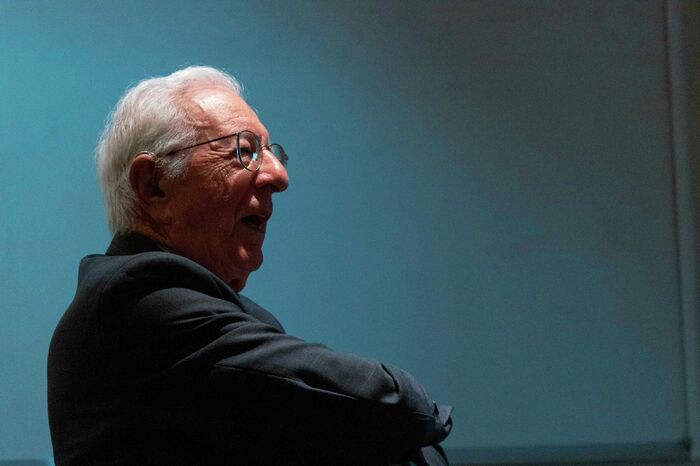Is Andrew Adonis out of touch with the Labour Party?
Lord Adonis discusses political extremism, Remainer hypocrisy, and the great political barrier that Brexit has created

Sitting down with Baron Adonis of Camden Town, I realised I was speaking to a rarity in today’s Labour party— a genuinely Blairite relic, who reminds you that Labour was once very different. As Tony Blair’s former policy chief in Downing Street, and as a minister under both Blair and Gordon Brown, he championed a politics that has been all but excised from the Labour party of today, which makes his recent candidacy in the European Elections all the more remarkable. He has many contradictions: an unelected peer, who served in cabinet and now champions a ‘peoples’ vote’; an Oxford don turned political operative; the policy wonk described as the ‘architect’ behind the creation of tuition fees who now calls for their abolition and, above all, a centrist in Jeremy Corbyn’s Labour party.
Labour politicians have often dressed down for Cambridge Union events, opting to ditch the dinner suits and bow ties in favour of a more casual appearance. They are, after all, far more conscious of class than their Tory peers. Adonis with his garish tie and yellow socks was no exception. He had the demeanour of a university lecturer (he started his career as a fellow of Nuffield College, Oxford) and spoke in a calm, self-assured manner and our interview felt more like a supervision than a heated political exchange.
We started by going back to where it all began. Alarmed about the future of the country during the industrial turmoil of the 1970s, he started reading the papers. At the age of 15, his head teacher lent him his personal copy of the biography of H.H. Asquith by Roy Jenkins, the Labour Home Secretary who defected to form the SDP. Adonis was impressed “in equal measure” by both Asquith and Jenkins and became a disciple of Jenkins. Realising “this political thing is really exciting and important”, he joined the SDP in 1981. As late as 1994 he was selected to contest the parliamentary seat of Westbury for the Liberal Democrats, but joined the New Labour project the following year.
I asked Adonis whether he saw a route back to the centre from within the Labour Party. Adonis was clear that for him, Brexit conquered all. To do anything serious, it must be stopped. “The critical issue in British politics at the moment is stopping Brexit democratically.” It struck me that the phrase ‘stopping Brexit democratically’ whilst popular with a Cambridge audience, is a contradiction in terms to leavers.
“It is not going to be possible to do anything serious and constructive in British politics, whether you’re on the moderate left, on the modern right, or in the centre if, for the next generation, we’re going to go through a massive national revolution in our relations with the European Union and our continent.” I couldn’t help thinking that his Brexit-centred, unifocal approach prevents him from acknowledging or responding to the tectonic shifts in the Labour Party since 2016.
Adonis offered no reproach of his party leadership in our interview, though in the past much of his criticism has centred around Corbyn’s ambiguity on Brexit. His assessment of the Tories was damning. “The real and present danger of extremism in British politics at the moment is the extremism of the Boris Johnson government, a coalition between the right of the Conservative party and the Brexit party that would fundamentally disrupt and throw into chaos our economic, social and diplomatic relations with our European partners. That would be a revolution in our standing as a country which would make sensible politics virtually impossible for the next generation”. By claiming that the threat of extremism comes exclusively from the right, he puts himself at odds with many of his former colleagues like Ian Austin, Lucciana Berger and Chuka Umunna who have left Labour, over its reaction to reports of anti-semitism within the party, among other reasons. Given that Labour is the first major political party under statutory investigation by the Equality and Human Rights Commission over institutional racism, one wonders if Adonis’ remarks display a lack of self-awareness.
“The causes of Brexit are [in] our deep social crisis”
Adonis himself has been accused of extremism for his tenacious support for Remain, and has dubbed the BBC the “public disservice broadcaster” for its supposedly pro-Brexit coverage. This hyperbolic rhetoric does not help the remain cause. Regardless of their political hue politicians, should not expect the beeb to merely parrot their views — it must reflect the mid-point of the sentiments of the nation as a whole. Sadly, Adonis is far from immune from the intemperate language characteristic of today’s Labour party. When Sajid Javid was appointed as Home Secretary, Adonis tweeted a caricature that appeared to show Javid (who is now Chancellor of the Exchequer) at his desk, with the caption: “I just want to settle in, get organised, then deport my parents!” He later apologised.
I pushed Adonis to answer the criticism often levelled at Remainers that they inhabit a very distant world from the people who voted leave. How does he bridge the demographic divide between those who voted leave and those who voted remain? How does he rebut the caricature of the supposed “elite” remainers? Adonis called this hypocritical. “It’s a bit rich coming from Conservatives who are as elitist as they come, to start telling the rest of us that we’re elitist.” This may be true of many Conservative politicians but not of the vast majority of leave voters.
“What I stand for is a democratic end to Brexit – this has to be by means of referendum or election where the people decide it. It’s three and a half years since the referendum, the circumstances are fundamentally different.” However, while the political circumstances have changed, the bitterly polarised divide remains. Remainers and leavers are further apart than ever before: if the 2016 binary was between leave and remain, today major parties offer the revocation of Article 50 to one set of voters and a no-deal to the other.
He argued that the overwhelming majority of people, however they voted, want a second vote. “We need to be, to coin a phrase,” he smiles at me and says with Blairite panache, “tough on Brexit and tough on the causes of Brexit. The causes of Brexit are our deep social crisis, particularly in poorer communities in a country where we need to offer and to deliver a new deal … that is the overwhelming demand of the poorer parts of the country that voted leave.” On this, his message echoes the Labour orthodox — that the root cause of Brexit was not the European Union but Tory-imposed austerity.
“We are never going to satisfy Farage on the militant right, just as in the 1980s the rise of Blair, Brown and Kinnock never satisfied the militant left, but I do believe we can build a broad consensus which ends Brexit, and which does so democratically.”
Adonis will certainly never satisfy the militant right or left, indeed he never has, but it remains to be seen whether or not this coalition will be able to stop Brexit - democratically or otherwise. As the nation moves ever closer to a General Election with the Conservative share of the vote in recent polls etching towards the forty per cent mark, and the smaller, unquestionably ‘Remain’ parties’ prospects blighted by the First Past the Post system, have the remain coalition missed their chance?
 News / Report suggests Cambridge the hardest place to get a first in the country23 January 2026
News / Report suggests Cambridge the hardest place to get a first in the country23 January 2026 Comment / Cambridge has already become complacent on class23 January 2026
Comment / Cambridge has already become complacent on class23 January 2026 Comment / Gardies and Harvey’s are not the first, and they won’t be the last23 January 2026
Comment / Gardies and Harvey’s are not the first, and they won’t be the last23 January 2026 News / Students condemn ‘insidious’ Israel trip23 January 2026
News / Students condemn ‘insidious’ Israel trip23 January 2026 News / Cambridge ranks in the top ten for every subject area in 202623 January 2026
News / Cambridge ranks in the top ten for every subject area in 202623 January 2026










